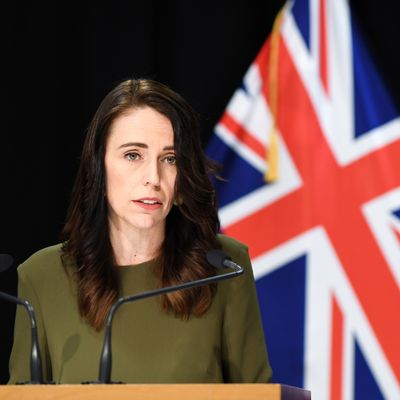
New Zealand is postponing its upcoming national election on account of a mysterious outbreak of COVID-19 in Auckland, the nation’s largest city, which has been under mandatory lockdown since Thursday. Prime Minister Jacinda Ardern announced on Monday that the election would be moved from September 19 to October 17 — and vowed that the date would not be moved again.
There are, as of Monday, 58 cases in the Auckland cluster, which ended a streak of more than 100 days without any known cases of community transmission in the country. While the outbreak is small compared to what is happening in most other countries — or most American states — it has been worrisome for New Zealand authorities, who have not been able to identify the source of the outbreak. And cases have continued to turn up since the lockdown began in Auckland, which is home to about 1.7 million people.
Ardern said the election delay was necessary to give the country’s Electoral Commission more time to prepare safety measures amid the new outbreak, to ensure maximum turnout, and to give political parties more opportunity to campaign. There also appears to have been broad support for the move within the country, both among political parties and voters, and particularly in Auckland.
Nonetheless, the outbreak presents at least the potential for a political crisis for Ardern, who had been campaigning on what had been the world-leading effectiveness of New Zealand’s response to the pandemic, which included a total lockdown of the country and closing it off from the world. That initial success, which had led to enviable return to life as normal across the country, made the prime minister very popular, but somehow the virus has been allowed back into New Zealand, and it’s not yet clear who is to blame. Then again, as the New York Times heard from a politics professor in the country on Monday, Ardern likely has a lot of credibility, and some leeway, among New Zealanders, and delaying the election as a popular precaution may reinforce that sentiment rather than counteract it. That’s what it’s like to live in a country where the federal government mounts an effective response to a pandemic and earns the trust and cooperation of the populace.
In addition, Ardern responded to the new outbreak quickly, announcing the Auckland lockdown less than six hours after she learned of the first handful of new infections discovered there. Nearly 100,000 new COVID-19 tests — roughly a sixth of the country’s total to date — have been administered since the middle of last week in the effort to track and halt the spread. And unlike lockdowns in the U.S., the restrictions have been strictly enforced.
As to the still-unknown origin of the outbreak, public-health experts in the country believe the most likely cause was some kind of breakdown in protocol involving border-facing workers, possibly at a hotel that was being used to house returning residents, who must go through a mandatory 14-day quarantine upon arrival from outside the country. To date, there have been a little over 1,600 confirmed or probable COVID-19 cases in New Zealand and 22 deaths from the disease.
President Trump, of course, has recently floated the idea of unilaterally delaying this fall’s presidential election because of the coronavirus, but doing so triggered immediate, near-universal bipartisan backlash from lawmakers. Trump can not legally delay the election on his own, but Ardern could in New Zealand, since the law only requires that the election happen before November 21 — not on a specific day like in the U.S.






























